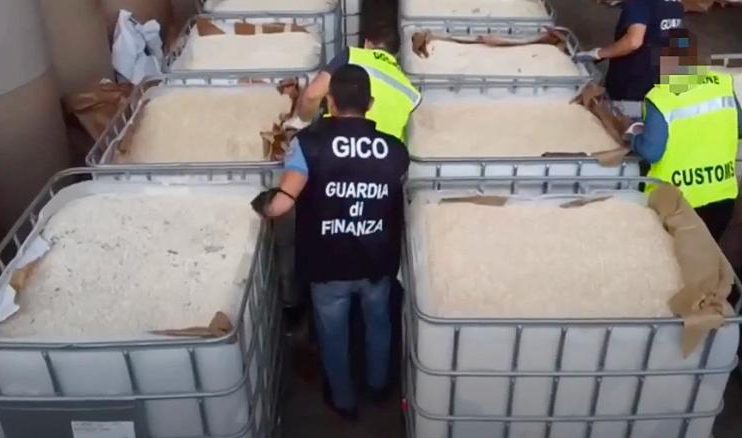By J.M. Phelps (One News Now)
A former federal law enforcement executive argues that a recent drug bust in Italy justifies the need for law enforcement and counterterrorism specialists to tear down divisive walls and start working together.
Italy’s recent colossal confiscation of an estimated 15.4 tons of amphetamines is described as the largest drug haul in the world in terms of both value and quantity. Allegedly produced by ISIS in Syria, the three containers seized by Italian authorities in the port of Salerno were reported to contain 84 million pills and have a street value of $1.12 billion.
Derek Maltz dealt with drug cartels and money laundering schemes during his time as a senior executive with the U.S. Drug Enforcement Administration (DEA).
“This huge drug seizure by the Italians, once again, demonstrates the dangerous connections between terror and crime, [which often plays a role in] global drug trafficking,” the former DEA executive asserts.
At the same time, terrorist groups around the world, like ISIS, are evolving and growing stronger, he tells OneNewsNow. “As they do, they continue to tap into the proceeds of crime to strengthen their ability to conduct operations,” Maltz adds.
According to Maltz, “ongoing problems” persist between law enforcement and counterterrorism agencies when it comes to these types of large drug busts. He explains that one of the problems is that the combined effort to investigate and combat terrorist organizations in countries around the world and in the United States is still being conducted in “silos.”
“There are very high walls up between those who investigate criminal activity and those who focus on terrorists – even though billions of dollars derived from crime are assisting the radical terror groups,” he explains.
“Government leaders must recognize and accept that our current systems must be enhanced and the post-9/11 information sharing walls must be eliminated. To continue operating in cocoons gives the terrorists a huge advantage – and the consequences are severe.”
The former head of the DEA’s Special Operations Division (SOD) identifies what he considers to be a “recipe for disaster,” pointing out that “even though agencies and senior leaders around the U.S. have acknowledged for many years the lethal connections between crime and terror, their actions haven’t closed the current intelligence gaps.”
Suggestion: Use the ‘Al Capone’ approach
To combat transnational organized crime networks, Maltz suggests the investigative agencies should implement the “Al Capone” model.
“Since we know terror groups are tapping into criminal activity to finance their radical agendas, we must use the experts [who are] fighting crime networks to shut down the elaborate terror-financing operations that are built on a platform using the proceeds of crime to support the terror groups,” he emphasizes.
Funding streams that benefit terror organizations must be shut down, he argues, stating the only way that is possible is by enforcing full information sharing between the law enforcement and intelligence communities.
“If authorities can take down a terrorist by investigating them for their involvement in a criminal activity like drug trafficking, arms trafficking, human smuggling, tax violations, counterfeiting or fraud, then we all win,” he maintains.
“In many cases, these terrorists are engaging in significant crime activity – and developing evidence on those crimes may be easier than providing authorities a more practical option to disrupt a potential terror act. This is the ‘Al Capone’ model.”
Maltz describes Capone as a “mass murder [who] had to be arrested on tax charges to stop his murders” – and he argues that many terrorists could be handled in the same fashion. If law enforcement agencies can be used to develop evidence on a suspected terrorist’s criminal violations, the former SOD head suggests “this would be a very effective way to remove them from a position to carry out a terror act.”
Cutting through the bureaucracy
According to Maltz, more and more terror-financing operations are operating around the world and gaining momentum by exploiting the weaknesses in the system.
“We have plenty of American patriots diligently working in all of the agencies daily to keep us safe,” he acknowledges, “but working together without the stove pipes and bureaucratic barriers would be way more effective and would also help save lives.”
Maltz points out that he and others who have spoken out against the system for years didn’t seem to get much traction on these critical national security matters due to bureaucracy and “kingdom builders in the Beltway.” Instead, business went on as usual.
Recently, former acting director of the National Counterterrorism Center, Russell Travers, was fired. Prior to exiting his post, Travers reiterated his concern about the obstacle of “bureaucratic turf wars” that impede efforts in the intelligence community.
Maltz wonders aloud: “If terrorists are tapping into the criminal networks for their funding and we have large bureaucratic beltway centers and stove pipes all over, how could anyone expect effectiveness?”
He considers it unfortunate that “those who are working on investigating terrorist organizations are not combining the resources available at all levels of law enforcement.” And he expects the problem will only get worse as the terror groups continue to tap into criminal proceeds to carry out their radical agendas.
“Task forces are only effective when agency representatives work as a team and use all experience, expertise and authority,” Maltz concludes. “[While the government has] very talented and dedicated workers, [there are] high walls that prevent information sharing and create gaps in the system.”
J.M. Phelps is a counter-terrorism specialist, suicide bombing expert, and freelance journalist, focusing on national security for OneNewsNow. He is also editor and publisher of the website Lantern of Liberty.
Originally published by One News Now on Wednesday, July 15, 2020.
This column is printed with permission. Opinions expressed in columns published by Lantern of Liberty are the sole responsibility of the article’s author(s), or of the person(s) or organization(s) quoted therein, and do not necessarily represent those of the staff or management of, or advertisers who support Lantern of Liberty.






